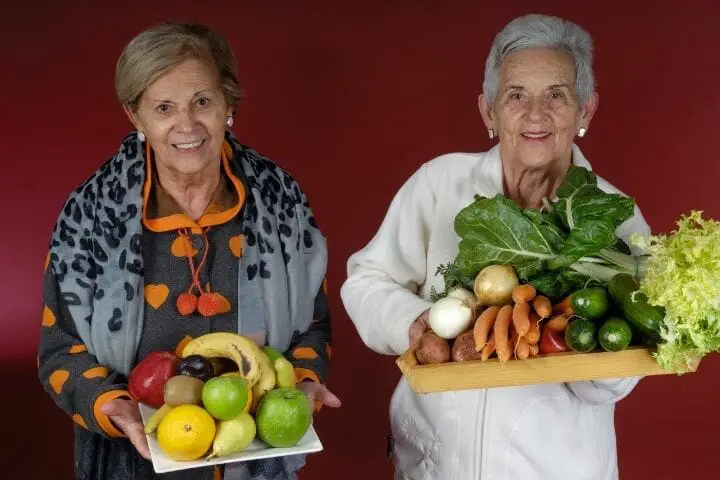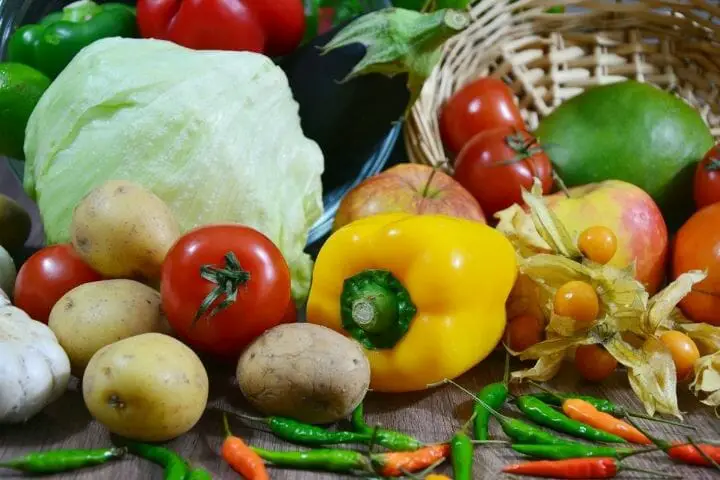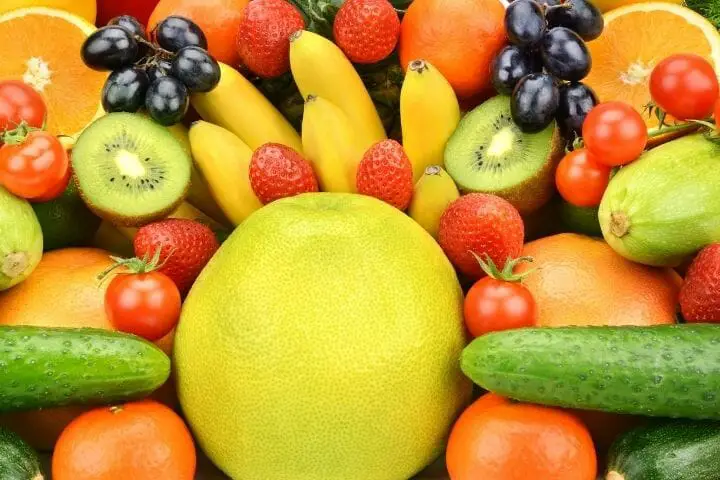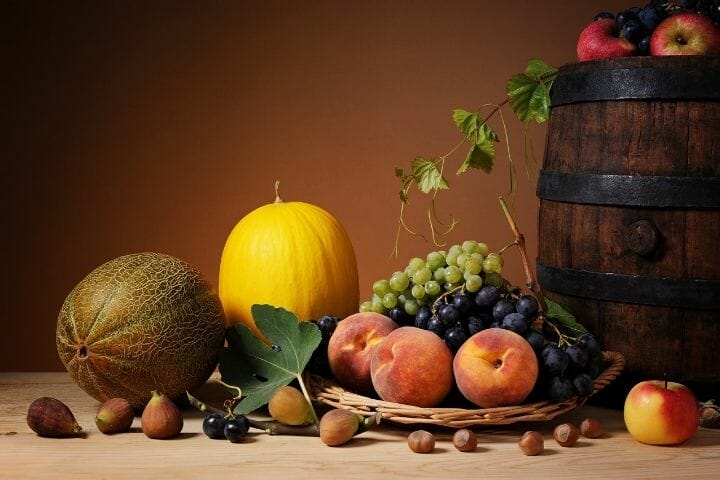We keep hearing fruits and vegetables are healthy for us. But what are the benefits of eating fruits and vegetables for seniors? Let us look at specifics in this article
Contents
Fruits and vegetables are known to enhance health. They protect us from inflammation and add a glow to our skin. Seniors need to eat at least five or more portions of fruits and vegetables every day to keep severe issues like cancer and heart diseases at bay.

Eating veggies has many health benefits for seniors, and they can reap all these benefits by including a variety of fruits and vegetables as a part of their daily diet. Let’s start our discussion by discussing the benefits of vegetables for seniors. Later we will discuss the benefits of fruits for them.
9 Benefits Of Vegetables For Seniors
#1 Keeps blood pressure in control
Nearly half of Americans have a higher blood pressure level as per research by CDC. Vegetables like spinach and beetroot can help them reduce the effect of a high sodium diet.
Different vegetables like spinach beetroot have a high potassium content and other essential nutrients. It consists of potassium and fiber. Potassium and fiber help keep healthy bowel movements and lower blood pressure.
#2 Enhances fiber intake
Fiber is an important part of our diet. It is excellent for your heart and your gut as it can keep you full for a longer period and reduce the risk of developing diabetes.
The elderly do not hit the recommended fiber intake of 38g per day for men and 25g per day for women if they don’t include veggies in their daily diet.
Seniors should focus on eating high-fiber foods like legumes, nuts, fruits, whole grains, and vegetables that help them get enough of this essential nutrient.
As vegetables consist of plenty of fiber, they also help seniors get rid of excessive fat.

#3 Helps fight inflammation
Some seniors can suffer from chronic inflammation, which is not suitable for their bodies. Aging, an unbalanced diet, smoking, and low levels of sex hormones result in chronic inflammation in elders.
Eating a good amount of vegetables is the best way to get rid of inflammation in the body. As they are rich in phytochemicals and antioxidants, it helps our body to fight inflammation.
#4 Improves their eyesight
Eye health is an important component of your life, especially when you use your phone and computer all day. It can strain your eyes if you use it continuously. Older adults can eat more vegetables to protect their eyes. Taking screen breaks is also an excellent way to reduce strain.
You will find these and some other additional carotenoids in various vegetables like basil, red pepper, spinach, broccoli, and corn. Including all these vegetables in the diet can prevent the risk of developing age-related macular degeneration and improve your eyesight.
#5 Improves Skin Quality
With age, the skin loses its elasticity. But you can take care of your skin by staying hydrated and getting good quality sleep. However, you can enhance the quality of your skin by eating healthy food.
Seniors can consume tomatoes as it consists of lycopene, which can help protect the skin from sunburn. Different vegetables like cucumber and celery are water content. It can help you stay hydrated. It is responsible for flushing the toxins out of the body.

#6 Reduces the risk of developing heart disease
Heart disease is one of the prominent reasons for the death of men and women in America. A healthy diet plays an important role in keeping your heart healthy. The benefit of consuming vegetables is that it gives you potassium and fiber. These two nutrients are perfect for heart health.
By including a variety of vegetables, you can manage your weight which takes off the pressure from your heart. Older adults need to have a variety of vegetables in their diet if they suffer from high cholesterol levels atherosclerosis. Leafy green vegetables and tomatoes are on the top of the list when it comes to foods for a healthy heart.
#7 Reduces the risk of cancer
No diet choice guarantees to keep you away from cancer but, vegetables are a good source of nutrients and antioxidants. They can reduce the risk of cancers. Various cruciferous vegetables like cauliflower, Brussels, and sprouts have cancer-fighting power.
They are the perfect source of folate, Vitamin C, potassium, and phytochemicals which protect us from carcinogens. Seniors can include cruciferous vegetables rich in sulforaphane as it protects our cells from carcinogens.
#8 Keeps your brain young
By including vegetables in your diet, you can keep your brain young. Different vegetables, especially leafy green vegetables, reduce the risk of dementia and Alzheimer’s disease. It consists of folate and antioxidants, the key element to keeping your brain young and healthy.

#9 Boost the immune system
Whatever we eat impacts our immune system. As we age, our metabolism weakens or goes down, and so does our immunity. Elders can boost their immune system by consuming veggies.
Vitamin C is a nutrient available in various vegetables like Broccoli and bell peppers. It is known to boost our immune system. Eating a well-balanced diet and everything in moderation is essential for the immune system. To fight diseases and cope with infection, it is necessary to have a good immune system.
You might like to read: How Much Sugar is Enough as You Age?
What Are The Benefits Of Fruits?
Fruits are a power pack of essential nutrients. It is densely packed with fiber essential to keep our gut healthy. Let’s have a glance at the benefits of eating fruits.
Fruits are rich in polyphenols
Apples are a rich source of vitamin C and plant polyphenols. Polyphenols have disease-fighting compounds that are found in plants. Apple is one fruit that is rich in polyphenols. It consists of soluble and insoluble fibers such as hemicellulose, cellulose, and pectin. Elders can manage their blood sugar levels by consuming at least two portions of fruits every day.
Apples help you manage your digestion and result in good gut and heart health. They are a good source of plant polyphenols and Vitamin C. They can reduce the risk of heart disease, stroke, cancer, obesity, overweight, and various neurological disorders. You can consume Apple every day to get all the essential polyphenols.
Apples alleviate bad digestion and an unhealthy gut. They are a good source of vitamin C and plant polyphenols. They are rich in vitamin c and plant polyphenols, they reduce the risk of neurological disorders, cancer, obesity, heart disease, overweight, and stroke.

Rich source of antioxidants
Fruits are a rich source of antioxidants and have multiple anti-inflammatory properties. They are rich in anthocyanin. Anthocyanin is a flavonoid and plant pigment that gives blue-purple color. Anthocyanin is found in blueberries. It helps fight cell-damaging free radicals that can lead to any disease. It is an excellent source of antioxidants.
Fruits rich in anthocyanin can help reduce the risk of type 2 diabetes, overweight, obesity, heart disease, high blood pressure, and certain types of cancer. They can also prevent cognitive decline.
Studies have concluded that there was a 5% decrease in the risk of type 2 diabetes in the people who consumed 17 grams of berries rich in anthocyanin. The other berries which are a good source of anthocyanin are cherries, chokeberries, blackberries, elderberries, and bilberries.
You might like to read: Quick and Easy Healthy Meals to Prepare for Seniors
Fruits can help you in weight management
Fruits are a good source of nutrients and are low in calories. They are an excellent choice for elders if they look to melt some extra fat. As they are high in water and rich in fiber, they can help you in weight management. Thus they can keep you full for an extended period. You can eat fruit until you feel full because it is low in calories.
Citrus fruits like oranges and apples are some of the most tummy-filling fruits. Elders can eat fruits instead of drinking a lot of fruit juice as it is high in calories and can result in insulin resistance and obesity.
They are low in cholesterol and sodium
Fruits are highly nutritious for elders as they only consist of a trace amount of sodium. A low sodium diet reduces the risk of stroke and results in low blood pressure. Cholesterol is not present in fruits, and thus it is the best thing to include in your diet.
Helps in overcoming dehydration
Elders who suffer from dehydration in the summer season can consume watermelon muskmelon. It is low in calories and is high in water content. Watermelon and musk melon has 92% of water content. Older adults who face the risk of dehydration can increase the intake of watermelon and muskmelon in the summer season. It is a tasty and refreshing way for seniors to stay healthy and hydrated.
For more hot weather safety tips, read our other article.

Tips To Add Fruits And Vegetables To The Senior’s Diet
Try different cooking methods
Instead of eating the same repetitive food repeatedly, try cooking the food with different cooking techniques like grilling, steaming, stir-frying, sauteing, and boiling. You can cook new recipes and try some new sauces. Make sure you do not add sugar, preservatives, or high fructose corn syrup.
Mix into smoothies
Smoothies are a great way to sip on new fruits and vegetables. Mixtures of different fruits provide adequate protein, which results in gaining muscle mass and strength. There are various healthy smoothie options like chocolate banana, peach, strawberry, blueberry, or mint.
Offer some dips
Offering dips is a great way to experiment with different fruits and veggies. You can try various dips like red pepper hummus, peanut butter, and Greek yogurt.
Bulk up the main dishes
You can create a combination of main dishes and different veggies together. You can include different veggies like bell peppers, chopped cucumbers, carrots, chilies into soups.
Add avocado and banana ice cream
Instead of eating ice creams packed with high refined sugar, try to consume avocado and banana ice cream. Banana is a natural sweetener and is known to fulfill the daily fruit requirements of an individual.
Seniors can invite their friends and other family members and serve it as a natural dessert. It is a great way to satisfy the taste buds and is healthy at the same time.
Try to whip up some popsicles
You can make some irresistible yogurt popsicles that are homemade. Popsicles are delicious and refreshing. However, they are loaded with high amounts of sugar and lack nutritional value. Seniors can enjoy the popsicles in the summertime staple, fulfilling the daily requirement of veggies, fruits, and protein intake.

Frequently Asked Questions
Can seniors who are affected by diabetes eat fruits?
People who have Diabetes can eat 3 to 4 servings of fruits each day. Many people restrict the consumption of fruits as they are worried about the sugar content.
However, when fruits are consumed in the form of whole fruit, then it doesn’t affect the blood sugar levels.
Fruits rich in fiber protect us against insulin resistance and fight against type 2 diabetes. The polyphenol content in fruits is known to control blood sugar levels. You must, however, not consume fruits like watermelon, ripe bananas, and mangoes because these fruits contain high amounts of sugar.
How many servings of vegetables should seniors eat every day?
Eating 5 to 9 servings of vegetables every day is essential. Eating this much portion of vegetables every day can boost your immune system. Elders can keep themselves full by eating this many servings of vegetables. You can cook and try new recipes out of fruits and vegetables.
Wrap up:
Elders face a lot of challenges when it comes to immunity and metabolism. To boost their metabolism, it is essential to increase the intake of fruits and vegetables. Eating fruits and vegetables has various benefits for seniors.
Fruits and vegetables protect against various diseases as they are rich in polyphenols and antioxidants it protects from various diseases. They can make our food tastier and enhance its taste.

In this article, we have outlined the multiple benefits of consuming fruits and vegetables for older adults. We hope the information that we have outlined has helped you understand why it is important for you to add fruits and vegetables in your diet. Do share your comments, queries and suggestions regarding the information provided in the comments section below.
If you liked the information provided, please share it with others you know who might need to read this information. Do share it on your social media and within your groups as well.
